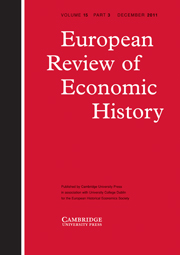Crossref Citations
This article has been cited by the following publications. This list is generated based on data provided by
Crossref.
Sylla, Richard
Wilson, Jack W.
and
Wright, Robert E.
2006.
Integration of Trans-Atlantic Capital Markets, 1790–1845*.
Review of Finance,
Vol. 10,
Issue. 4,
p.
613.
Conrad, Sebastian
and
Sachsenmaier, Dominic
2007.
Competing Visions of World Order.
p.
1.
Flynn, Dennis O.
and
Giráldez , Arturo
2008.
BORN AGAIN: GLOBALIZATION'S SIXTEENTH CENTURY ORIGINS (ASIAN/GLOBAL VERUS EUROPEAN DYNAMICS).
Pacific Economic Review,
Vol. 13,
Issue. 3,
p.
359.
Ronnback, K.
2009.
Integration of global commodity markets in the early modern era.
European Review of Economic History,
Vol. 13,
Issue. 1,
p.
95.
Reeves, Keir
Frost, Lionel
and
Fahey, Charles
2010.
INTEGRATING THE HISTORIOGRAPHY OF THE NINETEENTH‐CENTURY GOLD RUSHES.
Australian Economic History Review,
Vol. 50,
Issue. 2,
p.
111.
Schwartz, Robert M.
2010.
Rail Transport, Agrarian Crisis, and the Restructuring of Agriculture.
Social Science History,
Vol. 34,
Issue. 2,
p.
229.
Dobado Gonzáles, Rafael
and
Guerrero, David E.
2010.
The Integration of Western Hemisphere Grain Markets in the Eighteenth Century: Early Progress and Decline of Globalization.
SSRN Electronic Journal,
DE VRIES, JAN
2010.
The limits of globalization in the early modern world.
The Economic History Review,
Vol. 63,
Issue. 3,
p.
710.
Jacks, D. S.
2011.
Foreign wars, domestic markets: England, 1793-1815.
European Review of Economic History,
Vol. 15,
Issue. 2,
p.
277.
FEDERICO, GIOVANNI
2012.
How much do we know about market integration in Europe?1.
The Economic History Review,
Vol. 65,
Issue. 2,
p.
470.
DOBADO-GONZÁLEZ, RAFAEL
GARCÍA-HIERNAUX, ALFREDO
and
GUERRERO, DAVID E.
2012.
The Integration of Grain Markets in the Eighteenth Century: Early Rise of Globalization in the West.
The Journal of Economic History,
Vol. 72,
Issue. 3,
p.
671.
Flynn, Dennis O.
and
Lee, Marie A.
2013.
East Asian Trade before/after 1590s Occupation of Korea: Modeling Imports and Exports in Global Context.
The Asian review of World Histories,
Vol. 1,
Issue. 1,
p.
117.
Chilosi, David
Murphy, Tommy E.
Studer, Roman
and
Tunçer, A. Coşkun
2013.
Europe's many integrations: Geography and grain markets, 1620–1913.
Explorations in Economic History,
Vol. 50,
Issue. 1,
p.
46.
Panza, Laura
2013.
Globalization and the Near East: A Study of Cotton Market Integration in Egypt and Western Anatolia.
The Journal of Economic History,
Vol. 73,
Issue. 3,
p.
847.
Lampe, Markus
and
Sharp, Paul
2014.
Handbook of Cliometrics.
p.
1.
Ekberg, Espen
and
Lange, Even
2014.
Business history and economic globalisation.
Business History,
Vol. 56,
Issue. 1,
p.
101.
Ledger, Susan
Vidovich, Lesley
and
O’Donoghue, Tom
2014.
Global to Local Curriculum Policy Processes.
p.
37.
Dobado-González, Rafael
García-Hiernaux, Alfredo
and
Guerrero, David E.
2015.
West versus Far East: early globalization and the great divergence.
Cliometrica,
Vol. 9,
Issue. 2,
p.
235.
Olstein, Diego
2015.
Thinking History Globally.
p.
125.
Vandermarliere, Benjamin
Standaert, Samuel
and
Ronsse, Stijn
2016.
Structure and Evolution of the World's Historical Trade Patterns.
SSRN Electronic Journal,


